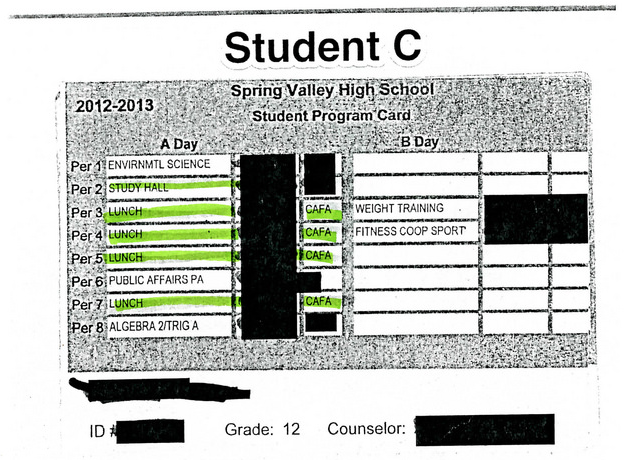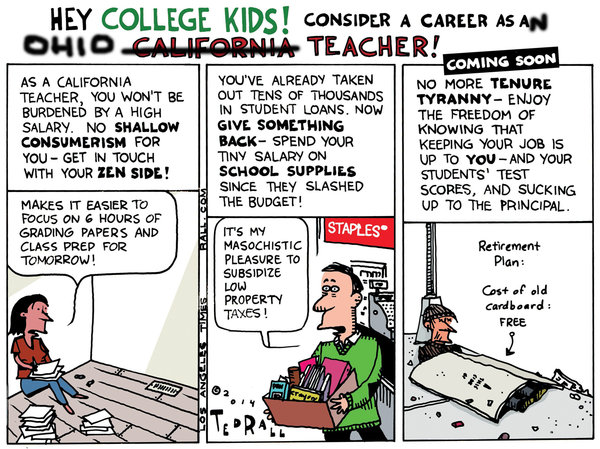This is the Way Public Education Ends
 Okay, so you really should give this a listen. It’s the story of a school district in New York where a motivated majority takes over the school board. They do it in order to destroy the public school system. You see, they educate their children privately and use their power to their own personal benefit at the public’s expense. They’ve illegally funneled money into their private religious schools. They’ve reduced their budget to the point where kids in the district have schedules that include four lunches and a study hall because they simply don’t have enough staff to teach courses. And on at least one occasion they had a building fraudulently appraised at half its value in order to sell it to themselves.
Okay, so you really should give this a listen. It’s the story of a school district in New York where a motivated majority takes over the school board. They do it in order to destroy the public school system. You see, they educate their children privately and use their power to their own personal benefit at the public’s expense. They’ve illegally funneled money into their private religious schools. They’ve reduced their budget to the point where kids in the district have schedules that include four lunches and a study hall because they simply don’t have enough staff to teach courses. And on at least one occasion they had a building fraudulently appraised at half its value in order to sell it to themselves.
So? Why should you care? Ohio isn’t New York. Because it’s a working model of how a group of people, duly elected, can go about destroying a public school system with impunity. It’s a model that can be adapted to work anywhere.
Any sign that such things are going on here?
Well, yes.
In troubled Reynoldsburg, for example, there dwells upon its board at least one member, Elaine Tornero, who actively campaigns against levies for her district and wouldn’t mind seeing more experienced, “jaded” teachers leave her schools. According to the Columbus Messenger, “After 15 years without an increase in local operating taxes, the district has made more than $20 million in cuts during the past five years and identified another $3 million for the next school year.” Tornero is unmoved, “We’ve made a lot of cuts,” she said. “Regardless, the community still feels as they do and the economy still is what it is. To throw it back on in May is just too soon.”
Things have also been interesting in Springboro, Ohio, where “(t)he board came under control of a three-person Tea Party faction a few years ago. The bloc was led by local parent Kelly Kohls, head of the Warren County Tea Party.” Their goal of teaching creationism in schools fell short when voters ousted that faction and moderates were elected in their place.
And there’s been some sign of Tea Party activists seeking control of school boards elsewhere in the state.
After a Tea Party takeover of the board In the West Clermont School District in Amelia, Ohio, the new majority was caught violating the law in order to switch legal council (eerily similar to what happened in East Ramapo, New York) in an effort to hire an anti-union law firm with no experience in education.
Now, Reynoldsburg has been through the wringer, Springboro corrected itself, the folks in West Clermont are fighting, and Tea Party takeovers have succeeded and failed to various degrees across the state. But let’s not lose sight of what’s happened in East Ramapo that was the subject of the piece on This American Life. Sure people there are fighting – they’ve got a Facebook page and a radio show, but they’re losing. Without a way to loosen the grips of the group currently controlling the board, they’re stuck.
The only remedy is an informed and educated electorate and enough registered voters with a functioning conscience.
Be active. Be informed. Vote.
By Vance J. Lawman
OEA Welcomes The Introduction Of Legislation To Delay The Use Of High-Stakes Decisions Based On Student Test Scores
COLUMBUS — October 21, 2014 — The Ohio Education Association (OEA) today applauded the introduction of House Bill 642 by Representative Teresa Fedor, D-Toledo. The bill calls for a 3-year suspension of high-stakes decisions based on student test scores in measuring student growth and evaluating teacher performance.
“As Senator Peggy Lehner, the chair of the Senate Education Committee, has noted – ‘we are over-testing our kids’,” said OEA President Becky Higgins. “We urge state lawmakers to hit the pause button and determine which tests are actually needed and which are also appropriate for the grade level at which they’re being administered.”
OEA believes that with the use of the new Common Core standards in Ohio schools and the prospect of even more tests being conducted, it is important to take more time to make sure the implementation of these standards goes well.
“We’ve seen what has happened in other states where the hasty implementation of Common Core and the related testing has led to a backlash among parents, students and educators,” continued OEA President Higgins. “We support Ohio’s New Learning Standards, but we want to make sure Ohio gets it right. That’s why we think taking the time to ‘test the tests’ would be a prudent course to follow.”
Last spring, OEA members voted unanimously at their Representative Assembly to support the 3-year delay in the use of high-stakes decisions based on student test results. OEA is pleased that 18 co-sponsors have already signed on in support of Representative Fedor‘s bill.
“We recognize the need for a comprehensive assessment of student growth. But student assessments should not be overly-dependent on the results of standardized tests, “said Higgins. “Students are spending too much time preparing for and taking tests. There needs to be a more balanced approach to identifying the strengths and needs of students.”
Join the conversation @OhioEA and Like Us at OhioEducationAssociation
###
The Ohio Education Association (ohea.org) represents 121,000 teachers, faculty members and support professionals in Ohio’s public schools, colleges and universities.
CONTACT: Michele Prater
614-227-3071; cell 614-378-0469, praterm@ohea.org
Support Public Education by Voting Out ALEC
American journalist Walter Lippmann once said, “Successful politicians are insecure and intimidated men. They advance politically only as they placate, appease, bribe, seduce, bamboozle or otherwise manage to manipulate elements in their constituencies.”
Most people’s viewpoints aren’t quite as cynical as Mr. Lippmann’s, but the simple truth is that some politicians do try to manipulate their constituents into agreeing with their initiatives by first stirring discontent. Satisfied people cannot be seduced, so to build a case for any crusade, these lawmakers try to create a need for the measure by cutting sources of funding. Such is the case with Ohio’s current state government.
 Three years ago, Ohio’s Republican governor and the GOP-controlled legislature used the state budget to drastically cut public funding to local governments, which they hoped would create a need for the “tools” provided in Senate Bill 5. Although Ohio voters overwhelmingly rejected the SB 5 tools in a referendum, those budget cuts created a significant loss of local facilities, services, and jobs, and elements in SB 5 have been introduced piecemeal ever since as cost-cutting measures in communities throughout Ohio.
Three years ago, Ohio’s Republican governor and the GOP-controlled legislature used the state budget to drastically cut public funding to local governments, which they hoped would create a need for the “tools” provided in Senate Bill 5. Although Ohio voters overwhelmingly rejected the SB 5 tools in a referendum, those budget cuts created a significant loss of local facilities, services, and jobs, and elements in SB 5 have been introduced piecemeal ever since as cost-cutting measures in communities throughout Ohio.
Deep cuts to Ohio public schools, as well as a plethora of unfunded mandates, have helped convince Ohio citizens that there’s a real need for the dramatic expansion of charter schools in the state. Unfortunately, Ohio charter school expansion is a non-transparent movement that has not been held accountable for its use of public tax dollars. Ohio Department of Education data shows that the state’s public schools lost more than $870 million in state funding to charter schools in fiscal year 2014, amid ongoing reports of theft, misappropriation of funds, overpayment to vendors, nepotism in the employment of family members, and excessively high administrative salaries in many charter schools.
The great majority of charter schools are managed by for-profit companies that donate lots of money to political campaigns. Could that be the reason charter schools are exempt from 270 provisions of Ohio Revised Code?
 There’s no requirement in state law that directs Ohio charter schools to disclose how much money is spent marketing commercials seen on prime-time television. State law doesn’t warrant that tangible property purchased with public funds remains public property when a charter school closes. There’s no requirement that board members of these schools represent parents — unelected boards are filled by the company that operates them or by friends and relatives of the school developer. Are the board members accountable to taxpayers or the corporate interests that put them there? For that matter, are our elected officials, who are supposed to monitor and regulate publicly-funded and privately-operated charter schools, accountable to taxpayers or the corporate interests that put them there?
There’s no requirement in state law that directs Ohio charter schools to disclose how much money is spent marketing commercials seen on prime-time television. State law doesn’t warrant that tangible property purchased with public funds remains public property when a charter school closes. There’s no requirement that board members of these schools represent parents — unelected boards are filled by the company that operates them or by friends and relatives of the school developer. Are the board members accountable to taxpayers or the corporate interests that put them there? For that matter, are our elected officials, who are supposed to monitor and regulate publicly-funded and privately-operated charter schools, accountable to taxpayers or the corporate interests that put them there?
Most of Ohio’s Republican legislators belong to a powerful organization of lawmakers and corporations, the American Legislative Exchange Council (ALEC.) In 2011, the Center for Media and Democracy (CMD) revealed the powerful control of the corporate-backed American Legislative Exchange Council (ALEC) over the legislative process in many states in the US. It published a report showing over 800 business-friendly bills that were created, endorsed, and secretly voted on by corporations and Republican lawmakers. People for the American Way, Progress Ohio, and Common Cause documented the hold that ALEC has on the legislative process in Ohio and divulged the fact that 43% of its legislators belong to this corporate bill mill.

ALEC strongly supports school privatization through charter schools and vouchers. According to Bill Phillis, of the Ohio Education and Adequacy Coalition: [quote]ALEC is a champion of charter schools and voucher legislation, and thus is geared toward starving the public common school. One of the missions of ALEC is to replace the public common school system with private market-driven education thrift stores. Some Ohio legislators will press forward the concept of a voucher for every student.[/quote] Ohioans can support their public schools by voting for candidates who are champions of public education. Voters must exercise their power at the polls to push back against ALEC legislators who placate, appease, bribe, seduce, bamboozle or otherwise manage to manipulate elements in their constituencies to further ALEC’s privatization agenda. This is an important election where voters can and will “create a need” for Governor John Kasich and his ALEC allies to find jobs outside of the political arena.
Visit action.ohea.org to learn more about OEA’s 2014 Campaign and how you can help to elect pro-public education leaders in this election.
By Jeanne Melvin, OEA-Retired
Comparative Analysis Of Imagine Schools Shows Below Average Performance Scores
Report Of Questionable Lease Deal Prompts Performance Review Of For-Profit Charter
COLUMBUS— October 15, 2014 — Prompted by reports of questionable leasing practices, a new analysis shows that the Imagine Schools have a below-average performance index score for charter schools, and a significantly lower average score than traditional public schools. The analysis was conducted by the Ohio Charter School Accountability Project which recently launched KnowYourCharter.com, a new website that provides important comparative performance data for parents, educators and taxpayers.
The 3rd largest for-profit charter school operator in Ohio, Imagine Schools, was the subject of a recent Columbus Dispatch report showing that millions of dollars in public money are being diverted from the classroom to pay for questionable leasing arrangements. The overall performance of the Imagine Schools is near the bottom of the struggling Ohio charter school sector, and nearly 70 percent of the grades for all Imagine Schools are D or F on the 2013-2014 state report card. Read the full analysis here: http://knowyourcharter.com/news/.
“The lagging performance of the Imagine Schools is a disservice to the students and calls into question the capacity of the schools’ operators to provide a quality education,” said Ohio Education Association President Becky Higgins. “The priority should be to make sure that adequate resources are devoted to the classrooms, not into the pockets of those collecting exorbitant rent for the buildings in which these schools operate.”
“Policymakers on both sides of this debate should be outraged that these questionable leases are diverting public money away from classrooms while student performance suffers,” said Innovation Ohio President Keary McCarthy. “This should be a wake-up call for lawmakers to get serious about imposing greater accountability and oversight of Ohio’s for-profit charter school operators.”
Visit and Like Us at: KnowYourCharter.com and facebook.com/KnowYourCharter
###
The Ohio Charter School Accountability Project is a joint venture of the Ohio Education Association and Innovation Ohio. The Ohio Education Association represents more than 121,000 teachers, faculty members and support professionals in Ohio’s public schools, colleges and universities. Innovation Ohio is a progressive think tank headquartered in Columbus.
Contacts: Keary McCarthy (Innovation Ohio), 614-425-9163
Michele Prater (Ohio Education Association), 614-378-0469
Support the candidates who are going to support you as an education professional
About this time four years ago, I entered my thirteenth year of teaching with a sense of excitement. I was feeling confident as a professional. I had just finished a summer of teaching English, and I remember telling colleagues that I could easily see myself teaching forty years. “What else would I want to do?”
This year, I start my seventeenth year feeling worry and frustration, which masks the excitement that comes with meeting a group of new students and forging new relationships. In place of teaching summer school, I spent the summer honing my skills as an activist, and forty years in the classroom seems laughable. I’m focusing on one year at a time.
My change of perspective and career focus comes not from being burned out by teaching, but from the barrage of attacks on public education and the teaching profession over the last four years.
Four years ago, there was no such thing as Senate Bill 5.
Four years ago, there was no Ohio Teacher Evaluation System (OTES), incorporating student test scores into teacher ratings.
Four years ago, there was no Third Grade Reading Guarantee to frighten teachers, students and parents with thoughts of retention for nine-year-olds.
Four years ago, our state legislature wasn’t allocating close to a billion dollars annually to under-performing charter schools that don’t have to be accountable with taxpayer dollars.
This time, four years ago, we had no idea what was coming as a result of the November 2010 elections.
Unfortunately, we now know the ramifications of that election. We know that it doesn’t matter whether you’re an educator who is Republican, Democrat or Independent. The education mandates of the last four years apply to all of us equally. We know what happens when we elect people who don’t value public education, who are more loyal to charter profiteers than to Ohio’s children.
With all that has happened in the last four years, is there any doubt how critical this November’s elections are?
Can we handle four more years of over-testing, under-funding and continuous attacks on our profession?
From now through November, we have to do all we can to support pro-public education candidates, regardless of their party affiliation. We have to make their stance on public education the defining factor in whether they get our votes or not.
It’s not just about who is in the Governor’s office. It’s about the State Board of Education, where we have a chance to elect people like retired teacher Michael Charney. It’s about the state-wide races, like Attorney General, Auditor, Treasurer and Secretary of State.
Take the pledge to Vote Public Education in this election! Then get your friends, neighbors, family members to do the same. Research shows that making a commitment and a plan to vote increases the likelihood that you will return your mail-in ballot, vote early in person, or get to the polls on Election Day, even when life tries to get in the way.
I know that over the next couple of months — between the lesson planning, grading and preparing for OTES — I must find time to support the candidates who are going to support me as an education professional, whether it’s by walking door-to-door, making phone calls or talking to colleagues, family and friends about the November elections and all that is at stake. I urge you to do the same.
By Dan Greenberg, Sylvania Education Association
Visit action.ohea.org for a list of pro-public education candidates.
October 2014 Ohio Schools
- IN THIS ISSUE
- Through the School Breakfast Program, Education Support Professionals and teachers are helping ensure that students have a healthy start to the school day
- Support public education in Ohio with your vote in Election 2014
- Legislative update, Association news, and more
Moved recently? Contact the OEA Member Hotline to update the address on file at 1-844-OEA-Info (1-844-632-4636) or email, membership@ohea.org. Representatives are available Monday-Friday, from 8:30 a.m. to 6 p.m. | OhioSchools — Past Issues
![]()
![]() Oh Yes, We’re Social — Join the Conversation!
Oh Yes, We’re Social — Join the Conversation!
![]()






